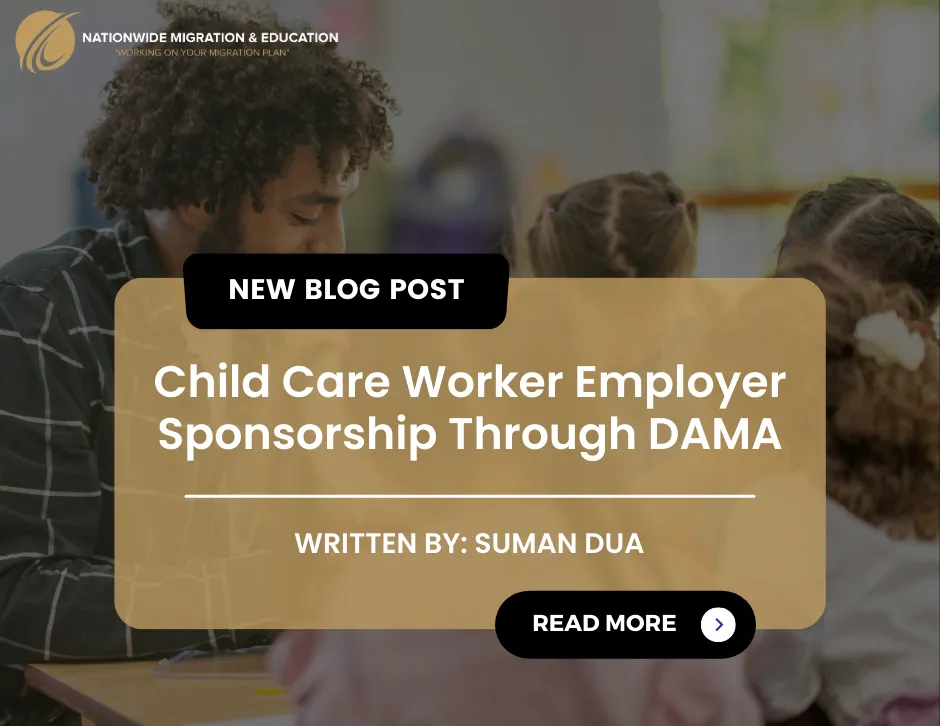April 13, 2023•3 min read
Suman Dua MARN 1800859Apr 13, 20233 min read
In this blog post, we will explore the Employer-Sponsored visa options for Child Care Workers through the DAMA agreement.
For those graduates of Child Care Qualifications, you are likely aware that to pursue General Skilled Migration, you must have been working as a Child Care Centre Manager or Room Leader. Obtaining this work experience as a new graduate is often impossible, so you may have only been able to secure work as a Child Care Worker. But did you know that the occupation of Child Care Worker is available for Employer Sponsorship under most DAMA Agreements?
DAMAs allow certain designated areas to sponsor their employees in occupations not usually available for the Employer sponsored visa program. You will need a skills assessment as a Child Care Worker, and for most DAMAs, skills are assessed under this occupation by ACECQA. The general requirements for most DAMAs are ACECQA nationally approved certificate III level (or higher) early childhood education and care qualification along with one year of full-time work experience. Requirements vary depending on the location of your sponsoring Employer, so we recommend you contact us to determine the exact conditions. Note: DAMAs operate in each state/territory of Australia, and even Family Day Care Worker is available in some regions of Western Australia (namely under the Goldfields DAMA).
DAMA, a Designated Area Migration Agreement (DAMA), is a type of Labour Agreement.
Labour Agreements are work agreements that enable approved employers to sponsor skilled and semi-skilled overseas workers for positions they cannot fill with local workers and in response to identified market shortages. These agreements are negotiated between the Department and employers or industrial associations.
Other labour agreements include:
DAMAs are labour agreements between a Designated Area Representative (DAR) and the Australian Government and provide access to additional occupations and concessions to standard migration programs under the:
· Temporary Skill Shortage visa (Subclass 482)
· Skilled Employer Sponsored Regional visa (Subclass 494)
· Employer Nomination Scheme (Subclass 186)
Once a DAMA is in place, local businesses can apply for endorsement and enter into individual labour agreements under the conditions of the relevant DAMA.
Do you know that as an employer of a Child care centre you can provide employer sponsorship under a DAMA or company-specific labour agreement?
If your Child care centre business finds it difficult to fill positions and retain Child care workers, consider employer sponsorship options. Operate in Regional Australia (ie, outside Sydney, Melbourne, or Brisbane). You may be eligible to access one of the many DAMAs across Australia to provide sponsorship for support workers. You can retain that employee for at least three years in the subclass 494 visa.
There are currently 12 DAMAs in place. These regions are:
Adelaide City Technology and Innovation Advancement,
East Kimberley, WA
Far North Queensland, QLD:
Goulburn Valley, VIC:
Great South Coast, VIC:
Northern Territory, NT:
Orana, NSW
Pilbara, WA
South Australia Regional,
Southwest, WA
The Goldfields, WA
Townsville, QLD:
DAMA's may contain age concessions, English concessions, or the TSMIT concessions that allow your employees to be sponsored even when they do not meet the minimum eligibility for the Employer sponsored visas.
In addition to using DAMAs, your business can set up a company-specific labour agreement to provide sponsorship to employees and future employees, including those outside Australia whose occupations are not on the usual occupation lists. Suppose your business needs help to retain employees across occupations available for sponsorship via the usual pathways. In that case, you can seek permission via a labour agreement to bring these employees to Australia (or keep them if they already work for you).
If you are a Child care centre looking to sponsor Child care workers in Australia and operating in one of the DAMA regions, please contact us.
